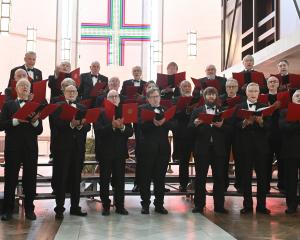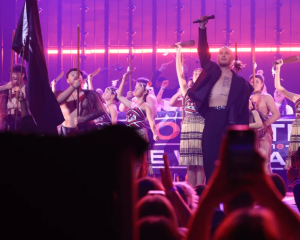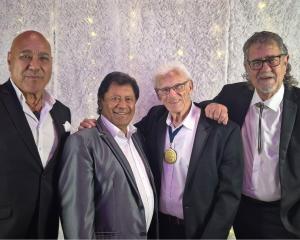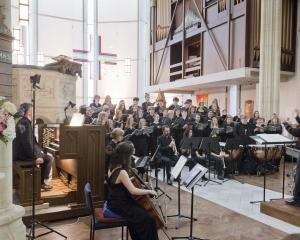The musical landscape may have changed significantly since the 1930s, but the music of Glenn Miller just keeps on swinging.
In the almost 70 years since Miller's mysterious death, his big-band arrangements have continued to resonate and will be played live on stage in Dunedin later this month, when the the Glenn Miller Orchestra (GMO) is on tour.
The orchestra, from the United States, will escort its audience down memory lane to Miller's original arrangements, as well as the music of the Andrews Sisters, Frank Sinatra and Vera Lynn, among others.
The concert promises more than just the music, with 24 musicians, singers and dancers taking the stage to bring the swing era back to life.
Musical director Rick Gerber says band members are looking forward to travelling to New Zealand.
Unlike much of today's music, which he says fades away after about three weeks in the charts, the style of music the orchestra plays lives on.
Included in the GMO's arrangements is music by composers Irving Berlin, Cole Porter, Rodgers and Hammerstein, George Gershwin, and songs found in The Great American Songbook (a collection of songs from the early 20th century).
''I programme the music to be, primarily, the original Glenn Miller classics that we play note for note.''
People always expect to hear songs such as Chattanooga Choo Choo, Tuxedo Junction and In The Mood, he says.
The orchestra musicians go all-out to re-create the original instrumental solos, he says.
''Even if the original was ad-libbed, we try to re-create everything note for note, even things we understand originally the Glenn Miller Band improvised and the next night might have played differently.''
This is because once the songs were on record, they became indelible, Gerber says, and people expect to hear the songs the GMO was known for.
Glenn Miller fashioned a signature sound to set his orchestra apart, even from other swing bands, by combining the sounds of the clarinet and the saxophone. According to the official Glenn Miller website, in Miller's music the clarinet and tenor saxophone contribute to the melody while saxophones play a complementary harmonic line.
''This aspect of the band's sound made the Glenn Miller Orchestra's music recognisable, distinguishing it from that of other groups.''
Gerber says some of the best-known hits of the 1940s were recorded in studios and played frequently on the radio and jukeboxes. However, bands had many fine songs and arrangements that were never recorded in studios, he says.
''... So I bring out a few the general public isn't that familiar with - beautiful songs they didn't know Glenn Miller did.''
The orchestra will also be doing something specially for New Zealand.
A history major at college, Gerber says he is a self-confessed ''history buff'' particularly interested in World War 2 but also aware of the Anzac efforts in World War 1.
His ''special arrangements for the people of New Zealand'' include the popular service song Now Is The Hour and the orchestra's Andrews Sisters-style group singing Pokarekare Ana.
''I hope it comes off well.''
While globally there seems to be an interest in ''retro'' entertainment, in the US fads are short-lived, Gerber says.
''Manufactured stars are given three to four years before they fade from glory, before a new manufactured product comes on the scene.''
He says the target market is teenagers who often fail to understand the difference between true singing and true musicianship, as they are distracted instead by visual fireworks on stage.
''I think 'what does that have to do with music'? They think 'wasn't that a great show'?'' Meanwhile, the GMO keeps on doing its thing.
''We just want everyone to come and have a great time and hopefully we will be playing at least a few of their favourite Glenn Miller tunes.''
Glenn Miller file
1937: Miller organises his first touring band, which is ultimately unsuccessful and disbands early the following year.
1938: The Glenn Miller Orchestra plays at the Glen Island Casino, New York, and is heard on radio. Several top-10 hits follow.
1941: Miller is presented with the first-ever gold record for Chattanooga Choo Choo.
1942: Miller joins the US Army, organising a service band.
1944: On December 15, Miller boards a plane in the United Kingdom bound for Paris, never to be seen again. One possibility is that his plane hit bad weather, but it is also possible it was hit by bombs jettisoned from Allied planes over the English Channel on their way back to base.
The show
The Glenn Miller Orchestra plays at Dunedin's Regent Theatre, on Wednesday, June 26, at 7.30pm.
Tickets
The Otago Daily Times has four double passes to the show to give away. To enter the draw, write your name, address and daytime phone number on the back of an envelope and send it to Glenn Miller, ODT Editorial Features, Response Bag 500015 Dunedin, or email playtime@odt.co.nz with Glenn Miller in the subject line, to arrive before Thursday.












